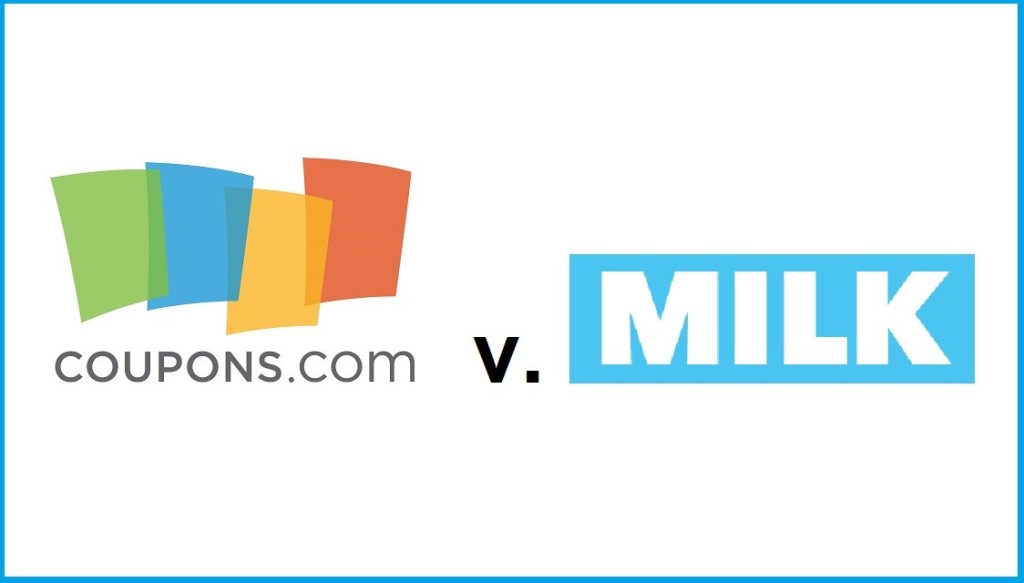Startups that aim to disrupt the coupon industry can sometimes find out the hard way, that the coupon industry instead wants to disrupt them. The most recent example has occurred in the form of a cease-and-desist order, followed by a lawsuit, from Coupons.com.
The recipients of these unpleasant pieces of correspondence were the creators of Milk, a coupon app discussed here just the other day. After the app was abruptly pulled last month, the co-founder admitted to Coupons in the News that the move was in response to an objection from someone in the coupon industry.
Turns out that “someone” was one of the biggest players in the digital coupon business – and their objection was more than just a polite protest.
Coupons.com has filed a lawsuit in the Superior Court of California, the home state of both companies, accusing Milk’s creators of “intentional interference with contract and negligent interference with prospective economic advantage.”
Milk, you may recall, promised to “take the pain out of grocery coupons,” by allowing users to tap a single button and automatically load every available digital coupon to their store loyalty cards. Users didn’t have to visit each store’s website or app, to browse and click the digital coupons they wanted – Milk would just automatically select them all, and users would get a surprise discount on whatever product happened to have a matching coupon available.
This, Coupons.com complained, is in violation of the “Coupon Economic System”.
The “Coupon Economic System”? Sounds very grandiose. But what does it mean? Allow Coupons.com to explain:
“By requiring the consumer to review and select the coupons before making his purchase decision,” Coupons.com stated in its lawsuit, the Coupon Economic System “allows manufacturers and retailers to benefit from consumer attention and interaction.”
Milk subverts this system, Coupons.com argued, by taking away all of the benefits for manufacturers and retailers. If a Milk user automatically redeems “any coupon that happened to be available for the brand he happens to have already selected, without having previously reviewed the product-specific coupon, then the consumer would be the only one who benefits.” Therefore, the company argued, the Coupon Economic System “would stop working, and it would no longer make economic sense to offer coupons, if coupons did not encourage consumers to try new brands, alter their brand purchases, or accelerate their purchases.”
That might make Milk ill-advised, but is it illegal?
Coupons.com argues that Milk unlawfully interferes with its contractual agreements and its ability to do business with manufacturers. Clipping all of those coupons, most of which ultimately go unused, complicates manufacturers’ ability to accurately budget and predict how many of their coupons will be clipped and redeemed. Plus, manufacturers have to pay Coupons.com a fee for every coupon that’s clipped – regardless of whether it’s ever used.
That’s why Coupons.com says its terms of service “forbid consumers from using any automated process to activate coupons… without consciously selecting which coupon they wish to use.”
Milk debuted just this past November, but Coupons.com said it almost immediately began receiving complaints from its manufacturer and retail partners. So, in early December, Coupons.com demanded that Milk’s founders cease and desist offering the Milk app. The founders declined, so Coupons.com sued later that month.
And a week later, Milk disappeared, with the disingenuously cheery message, “We are working with manufacturers and grocery stores on a new version of Milk that delivers a better experience for more people.”
Milk co-founder George Ruan did not respond to a request for comment about the lawsuit. But, in response to an earlier inquiry about the app’s sudden withdrawal, he told Coupons in the News that Milk “was designed to be a grocery coupon app for non-couponers by removing the friction that prevents so many of us from participating in the ecosystem. Even though removing the friction will lead to a massive expansion of the overall market, some players are more interested in defending their existing interests to ensure maximum value extraction.”
Coupons.com is seeking unspecified damages, a permanent injunction preventing Milk from ever being made available again, and a “declaration that the Milk application is unlawful and unlawfully interferes with Coupons’ ability to perform its contracts.”
Coupons.com also wants Milk to surrender any ill-gotten profits, though Milk users were given a three-month trial period before being charged $2.99 a month or $9.99 a year, so it doesn’t appear that Milk was even around long enough to make any money.
For Milk’s supporters, giving non-couponers an easy way to save money might seem like a noble, power-to-the-people kind of goal. But “the coupon business only works if all parties benefit,” Coupons.com argued. The outcome of this legal case could determine whether it’s the non-couponers who win – or the “Coupon Economic System” itself.














